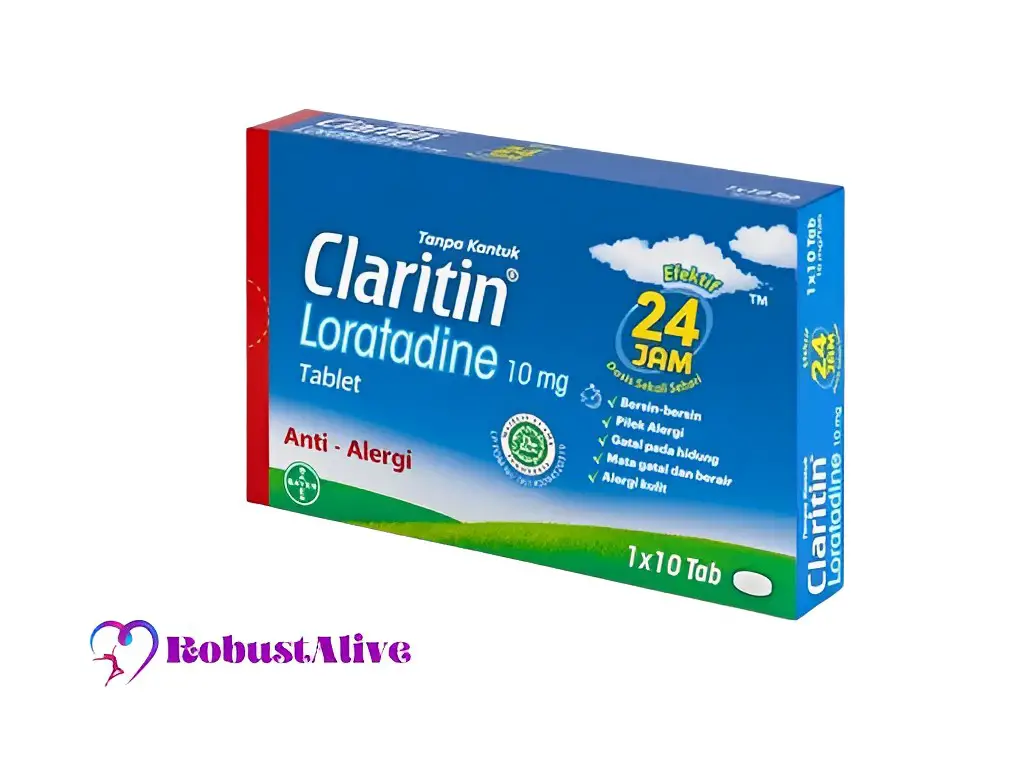How Long Does Claritin Stay in Your System?

When it comes to managing allergies and finding relief from troublesome symptoms such as sneezing, itching, and congestion, many individuals turn to over-the-counter antihistamines like Claritin.
However, one question often arises is how long does Claritin stay in your system?
Claritin starts working in 1-3 hours and lasts about 24 hours. It takes 3-5 days to be eliminated from your body, but it may take up to 10 days in older adults. Factors like metabolism, liver function, and hydration can affect clearance time.
In this article, we delve into Claritin and its presence in the body, exploring the factors that can impact how long it stays in your system.
What is Claritin?
Claritin is a brand name for a medication called loratadine. It is an over-the-counter antihistamine commonly used to treat allergies. Allergies occur when your body’s immune system overreacts to substances like pollen, pet dander, or dust mites and releases histamine.
When you come into contact with an allergen (the substance that triggers your allergy), your body produces histamine, which causes symptoms like sneezing, itching, runny nose, and watery eyes. This is where Claritin comes in.
Read More: Does Yellow Dragon Fruit Make You Poop?
How Does Claritin Work?
Claritin works by blocking the effects of histamine in your body. It does this by binding to histamine receptors, preventing histamine from attaching to these receptors and triggering the allergic response. By blocking the action of histamine, Claritin helps relieve symptoms like sneezing, itching, and runny nose, making you feel more comfortable.
It’s important to note that Claritin is not a cure for allergies, but it can provide temporary relief from the symptoms. If you have severe allergies or persistent symptoms, it’s advisable to consult a healthcare professional for further evaluation and guidance.
How Long Does Claritin Stay in Your System?

Graphics Credit: Robustalive.com
After taking Claritin orally, you can expect it to start working within 1 to 3 hours. However, your specific product may influence the onset time, with oral tablets typically providing faster effects than capsules. The full impact of Claritin is usually felt around 8 to 12 hours after a dose. Claritin is designed to provide relief for approximately 24 hours, so it is generally recommended to be taken once daily.
The duration of Claritin in your body can vary depending on factors like its active ingredient’s half-life, metabolism, liver function, hydration levels, and the presence of other substances or medications.
-
Half-Life and Elimination
To understand how long Claritin stays in the system, it is essential to consider its half-life. The half-life of a drug refers to the time it takes for half of the dose to be metabolized and eliminated from the body. For Claritin (loratadine), the average half-life is approximately 8 hours.
After about 8 hours, half of the dose of Claritin is eliminated, and after another 8 hours, half of the remaining amount is metabolized. Following this pattern, it can be estimated that Claritin is effectively eliminated from a person’s system within 3 to 5 days. However, it may take up to 10 days for complete elimination in geriatric patients.
-
Metabolism And Individual Factors
Several individual factors can influence how long Claritin stays in your system. Metabolism plays a significant role, with individuals having faster metabolic rates tending to eliminate drugs more quickly than those with slower speeds. The liver function also affects the clearance of medications, including Claritin, as the liver is responsible for metabolizing and eliminating drugs from the body.
Hydration levels and overall health can impact drug elimination as well. Staying adequately hydrated helps maintain optimal organ function, including the liver and kidneys, which are involved in the elimination processes. Additionally, other medications or substances in your body can interact with Claritin, potentially affecting its metabolism and clearance.
-
Variations in Clearance Time
While the average time for Claritin to be eliminated from the body is 3 to 5 days, it’s important to note that individual variations can occur. Age, overall health, and underlying medical conditions can influence drug clearance. In geriatric patients, it may take longer for Claritin to be eliminated entirely, potentially up to 10 days.
Claritin Side Effects
Claritin typically does not cause many side effects. However, in rare cases, some individuals may experience specific effects. If you notice any unusual or unexpected reactions after taking Claritin, it is important to promptly contact your doctor for further guidance.
Although it is uncommon, a severe allergic reaction to Claritin can occur. Seek immediate medical assistance if you observe any symptoms of a severe allergic reaction, such as:
- rash
- itching
- swelling (especially in the face, tongue, or throat)
- severe dizziness
- difficulty breathing
However, the list of possible side effects mentioned above is incomplete. If you experience any other effects that are not mentioned here, it is advisable to get in touch with your healthcare provider or pharmacist for further advice.
Also Read: Is Caesar Salad Healthy?
How to Use Claritin?
To use Claritin, follow these instructions:
- Read the directions on the product package carefully before taking the medication. If you have been prescribed Claritin by your doctor, follow their instructions and the information on the prescription label. If you have any questions or concerns, consult your doctor or pharmacist.
- Take the medication by mouth, either with or without food, as directed by your doctor or the product package. This is usually done once a day.
- If you are using chewable tablets, chew each tablet thoroughly before swallowing.
- If you are using the liquid form of Claritin, use a particular measuring device or spoon to measure the dose carefully. Avoid using a household spoon, as it may not provide the correct amount.
- If your allergy symptoms do not improve after three days of treatment, or if you have hives that last longer than six weeks, inform your doctor. Seek immediate medical help if your condition worsens or you experience a severe allergic reaction.
Recommended Dosage of Claritin
The recommended dosage for Claritin varies depending on the patient’s age and the condition being treated. Here is a breakdown of the usual dosages for different age groups:
| Age Group | Dosage | Maximum Daily Dose |
| Adults | 10 mg orally once a day | 10 mg/day |
| Children 2-5 years | 5 mg orally once a day | 5 mg/day |
| Children 6 years and older | 10 mg orally once a day | 10 mg/day |
Stay within the maximum daily dose unless instructed by a healthcare professional.
- Missed Dose
If you miss a dose of Claritin, continue with your regular dosing schedule. Take only one dose simultaneously to make up for the missed dose.
- Overdose
In the case of an overdose, taking more than the recommended amount of Claritin, you may experience symptoms such as a headache, feeling drowsy, or a fast and pounding heartbeat. If you suspect you have taken too much Claritin, seek immediate medical attention or contact the Poison Help line at 1-800-222-1222 for assistance.
Drug Interactions
Claritin can interact with other medications and substances, potentially affecting how they work or increasing the risk of severe side effects. It’s important to inform your doctor and pharmacist about all the products you are using, including prescription and non-prescription drugs, as well as herbal products.
Avoid using medications containing desloratadine while taking loratadine, as these two are very similar. Combining them may lead to unwanted effects. Additionally, Claritin can interfere with certain laboratory tests, such as allergy skin testing, which may result in false test results.
It is crucial to inform the laboratory personnel and all your doctors about your use of Claritin to ensure accurate testing and proper medical care.
Precautions
When taking Claritin, it’s essential to follow certain precautions:
- If your doctor has prescribed epinephrine for allergic reactions, it’s essential to always have your epinephrine injector with you. Remember that loratadine should not be used as a substitute for epinephrine. If you are self-treating with loratadine, make sure to read the instructions provided by the manufacturer carefully. If you have any doubts or concerns, consult your doctor or pharmacist.
- For children, the use of Claritin tablets or capsules is not recommended for those under 6 years old, unless directed by a doctor. Similarly, the use of liquid or chewable tablets is not recommended for children under 2 years old, unless directed by a doctor.
- Please inform your doctor or pharmacist about any allergies, including allergies to loratadine itself, desloratadine, or any other substances. This medication may contain inactive ingredients that could cause allergic reactions or other problems. If you have any questions, speak to your pharmacist for more information.
- Before using loratadine, disclose your medical history to your doctor or pharmacist. If you have certain medical conditions, such as kidney or liver disease, do not self-treat with loratadine without consulting your doctor first.
- Loratadine typically does not cause drowsiness when used at recommended doses. However, refrain from driving, operating machinery, or engaging in activities requiring alertness until you are confident you can perform them safely.
- If you have hives and your doctor has prescribed loratadine or if you are considering using this medication to treat your hives, promptly inform your doctor if you experience any of the following symptoms, as they may indicate a more severe condition: hives that have an unusual color, hives that appear bruised or blistered, or hives that do not itch.
- Liquid products or chewable loratadine tablets may contain sugar and aspartame. If you have diabetes, phenylketonuria (PKU), or any other condition that requires you to limit or avoid these substances in your diet, exercise caution. Consult your doctor or pharmacist to ensure the safe use of this product.
- Older adults may be more sensitive to the side effects of loratadine, especially drowsiness or confusion. These side effects can increase the risk of falling.
- During pregnancy, loratadine should be used only when needed. It is essential to discuss the risks and benefits of the medication with your doctor before taking it.
- Loratadine can pass into breast milk, which is unlikely to harm a nursing infant. Consult your doctor before breastfeeding while using this medication.
Remember, following your doctor’s instructions and consulting them or a pharmacist if you have any questions or concerns about taking loratadine is essential.
Read More: Why Does Lemonade Make My Stomach Hurt?
Frequently Asked Questions (FAQs)
-
Does Claritin Make You Sleepy?
No, Claritin (loratadine) is considered a non-sedating antihistamine and does not usually cause drowsiness. However, some individuals may experience drowsiness, so it’s essential to use caution and assess how it affects you before engaging in activities that require alertness.
-
Can You Drink Alcohol With Claritin?
It is not recommended to drink alcohol while taking Claritin (loratadine) due to the potential for increased side effects, including a higher risk of alcohol-related liver disease, as Claritin can remain in your system for more than 40 hours after taking a dose. It is advisable to avoid alcohol during this timeframe to ensure your safety.
-
Is Claritin The Same As Cetirizine?
No, Claritin and cetirizine are not the same. They are different medications with different active ingredients, with Claritin containing loratadine and cetirizine being the active ingredient in Zyrtec.
Conclusion
In conclusion, Claritin (loratadine) is an antihistamine used to treat allergies by blocking the effects of histamine in the body. It typically remains active for around 24 hours and takes 3 to 5 days to be eliminated entirely from the system.
How long does Claritin stay in your system also depends on factors such as metabolism and liver function.





